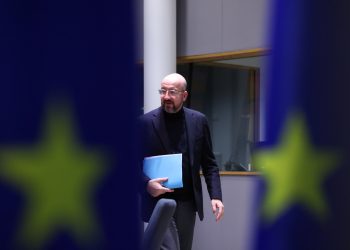Brussels–Ambassadors from the 27 EU member states reached last night (January 29) an agreement in principle on a proposal to collect the extra profits generated by assets of the Russian Central Bank frozen in Europe to contribute to financing the reconstruction of Ukraine after the Russian invasion. A first step that will lead the European Commission to propose at a later date the transfer of these resources to Kyiv, although it is unclear when.
EU Ambassadors just agreed in principle on a proposal on the use of windfall profits related to immobilised assets to support #Ukraine’s reconstruction .#COREPERII #EU2024BE
— Belgian Presidency of the Council of the EU 2024 (@EU2024BE) January 29, 2024
The agreement-in-principle needs to be legally refined and finally approved in Coreper in a written procedure, diplomatic sources explain to Eunews. The Belgian presidency at the helm of the EU needed to succeed in reaching an agreement in principle before the Thursday, February 1, extraordinary summit to break the deadlock on the mid-term review of the long-term budget (2021-2027). And so it was. On December 12, the
European Commission proposed to start collecting the extra profits generated from capital tied up in the EU to rebuild Ukraine. The ‘how to’ was to be determined in a second stage: for now, the ambassadors have agreed to move profits from sanctioned Russian assets in the EU into a separate account as a first cautious step to then proceed to use them to finance Ukraine’s reconstruction. In Brussels, there is talk of a ‘phase 1’ and, in due course, a proposal on how to use these resources in practice (the so-called ‘phase 2’).
To avoid legal problems, the Commission proposed to use not the actual assets (which the European Commission estimates at about 211 billion euros) but the profits derived from them being frozen in EU territory, mainly held at Euroclear, in Belgium, and Clearstream, in Luxembourg. The proposal will not be retroactive, so it cannot target the extra profits made so far, but when governments find a common position on the issue. And only resources of the Russian Central Bank, which is subject to a sanctions regime.
English version by the Translation Service of Withub







![Un motoscafo in Svezia. Nell'Ue si pone un problema di mancato riconoscimento delle patenti nautiche [foto:
Matti Blume, Wikipedia Commons. Copyright: Creative Commons Attribution-Share Alike]](https://www.eunews.it/wp-content/uploads/2024/11/motoscafo-Saltsjoen_Stockholm_P1090679-120x86.jpg)
